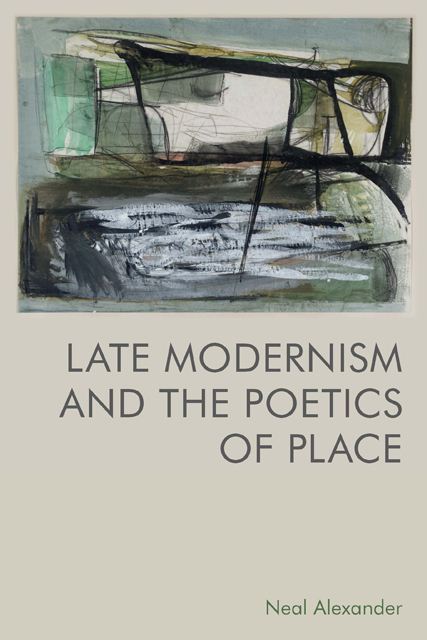Book contents
- Frontmatter
- Contents
- Acknowledgements
- Introduction
- 1 David Jones: The Sites of History
- 2 Basil Bunting’s Regional Modernism
- 3 W. S. Graham: Between Places
- 4 Lorine Niedecker: Life by Water
- 5 Charles Olson’s Mappemunde
- 6 Gwendolyn Brooks: From Bronzeville to the Warpland
- Conclusion: After Late Modernism
- Notes
- Bibliography
- Index
Conclusion: After Late Modernism
Published online by Cambridge University Press: 18 November 2022
- Frontmatter
- Contents
- Acknowledgements
- Introduction
- 1 David Jones: The Sites of History
- 2 Basil Bunting’s Regional Modernism
- 3 W. S. Graham: Between Places
- 4 Lorine Niedecker: Life by Water
- 5 Charles Olson’s Mappemunde
- 6 Gwendolyn Brooks: From Bronzeville to the Warpland
- Conclusion: After Late Modernism
- Notes
- Bibliography
- Index
Summary
One of the core arguments of this book is that late modernism in Anglophone poetry is best understood not as a phase of decline or obsolescence, nor of assimilation to mainstream cultural values, but as the stubborn living on of modernist aesthetic energies in the post-war period and well into the second half of the twentieth century. Nonetheless, as Peter Howarth remarks, the term ‘late modernism’ seems to imply a condition of ‘belatedness – as if living and breathing poets were just survivals from another age, rather than ahead of their time’. As the foregoing chapters make clear, my view of such ‘survivals’ in the work of Gwendolyn Brooks, Basil Bunting, W. S. Graham, David Jones, Lorine Niedecker, and Charles Olson is that they are more often heroic than pathetic, and always interesting. In this conclusion I want to consider the significance of such survivals, particularly the role that late modern-ist poets play as mediating figures, key influences for a range of younger poets from Britain, the United States, and the Caribbean for whom, in Marjorie Perloff's words, the ‘modernist challenge […] remains open’. In doing so, I also hazard some answers to the question of what comes after late modernism.
Lines of influence from the first generation of modernist writers run through the work of late modernist poets in a variety of ways. The examples of Ezra Pound and William Carlos Williams are especially important for Bunting and Olson, who each met and corresponded with the elder poets for many years. For Niedecker, aspects of Pound's and Williams's poetics were crucial for the development of her own style, though their influence was largely indirect, mediated by her friend Louis Zukofsky. More important for the poetry of Jones and Graham were the linguistic and formal experiments of T. S. Eliot and James Joyce, particularly The Waste Land and Finnegans Wake. Brooks also acknowledged the powerful influence of Eliot on her own work, though her formative encounters with modernist poetics came via the poets of the Harlem Renaissance, especially Langston Hughes. There are some important differences between modernist and late modernist poets, however, not least in terms of their political alignments.
- Type
- Chapter
- Information
- Late Modernism and the Poetics of Place , pp. 199 - 207Publisher: Edinburgh University PressPrint publication year: 2022



